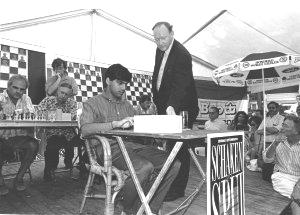Behind chess games, there are stories. Suppose you have a big database,
and for some  reason
you decided to play over the game Anand - Krabbé, clock blindsimul
(5) Amsterdam 1991, 40 moves, draw. (I know it is in some.) You'd see the
moves, how Anand got into a bad position and extricated himself ingeniously,
but you wouldn't know it had been played on a cheerfully sunny Sunday in
September, in a half-open tent in the center of the city, watched by noisy
chess-lovers and passers-by. The database also wouldn't tell you that between
moves, I was looking out to the street to see if the wonderful girl was
coming back who had borrowed my car for an errand, and with whom I had
just spent the night for the first time.
reason
you decided to play over the game Anand - Krabbé, clock blindsimul
(5) Amsterdam 1991, 40 moves, draw. (I know it is in some.) You'd see the
moves, how Anand got into a bad position and extricated himself ingeniously,
but you wouldn't know it had been played on a cheerfully sunny Sunday in
September, in a half-open tent in the center of the city, watched by noisy
chess-lovers and passers-by. The database also wouldn't tell you that between
moves, I was looking out to the street to see if the wonderful girl was
coming back who had borrowed my car for an errand, and with whom I had
just spent the night for the first time.
I'd met her three days before in the city where she lived, not far from
Amsterdam. I was there to give a talk in a little theatre, and afterwards
I had a beer in the café next to it. There were three girls sitting
at the bar there, one blond, one dark, one redhead. The blond, the only
one whose face I could see, had a splendid laugh. She was very attractive.
I looked at her, trying to catch her at looking back. She did look in my
direction, but without ever really locking eyes.
'Come on,' I said to myself, 'don't be a fool. You're
48, and these girls can't be older then 24. So let's be a fool. After this
sip of beer, I will do it.' And I did. I went up to her, said something
like: 'Hey, hi, I saw you, and I just thought...' and then I saw the face
of the redhead.
Fate helped. Fate was okay that night. The blond
and the darkhaired girl had to go, the redhead stayed. We talked, and when
I thought it was time for me to go to my car, she thought it was time for
her to go home. We left the café together and walked through her
dark streets. When our ways parted, the threefold social kiss became a
series of little kisses, very light, never quite touching each other's
lips, incredibly full of feeling.
I called her two days later, a Saturday morning. The weather was beautiful,
did she have anything to do? A few hours later we were driving over little
roads and along waters between her and my city. We sat on a floating terrace
where she told me that she liked it so much that in tennis, the player
who makes the least points can win the match. 'That happens once in about
sixteen best-of-fives,' I said, 'I wrote a computer simulation for that.'
She had also written little computer programs. She
wrote higgledy-piggledies, too.
A bit later, driving through the green fields, I
said: 'Shall we get out and roll through the grass here together?'
'No,' she said. 'I have to know you better for that.
At least half an hour better.'
There was a little problem. It was obvious we were
going to stay together - if fate could help it: for the rest of our lives
- but I had to go to a party that night, and I had already dated another
girl. Oh, I was a ladies man in those days. We didn't want to part, so
we went to get the other girl together. And we brought her home when it
was almost light again. And then we went home ourselves, and to bed.
I had maybe had an hour's sleep when I woke up and remembered the chess
tournament I had to play that Sunday - 'Schaken op het Spui'; a
blitz team tournament in a tent, followed by a blind clock simul by Anand
against five; the winning team plus a chess-playing celebrity.
She had something to do, too. She had to get an
old refrigerator a friend had promised her, somewhere up in the country,
so I lent her my car and raced to the chess tent on my bicycle. When I
had finished my first game (I won, of course), I saw her again: she didn't
know how to get the car into reverse; would I come and help her?
I was back in time to win my second game. And the
third. Swept them right off the board, all of them. Even wrote down a few
of those games later. Here is one, just to show you how a man plays after
sleeping with a girl like that.
Krabbé - NN, Amsterdam 1991, blitz 15'
1.e4 e5 2.Nf3 Nf6 3.Nc3 Bb4 4.Bc4 O-O 5.O-O d6 6.d3 Bg4 7.Bg5 c6
8.Qe2 a6 9.Nd1 Nbd7 10.Ne3 Be6 11.Nf5 Bxf5 12.exf5 d5 13.Bb3 Qc7 14.Kh1
Bd6 15.g4 Nxg4 16.Rg1 e4 17.dxe4 dxe4 18.Rxg4 exf3 19.Qxf3 Ne5 20.Bf6 g6
21.fxg6 hxg6 22.Qh3 and he resigned, he's mate next move.
I won't give a diagram, because it would spoil the
title of this story ('A love story with two diagrams', what a ridiculous
title that would be), but really because it would single out a moment,
when the whole point is that I played like a goddam Morphy the whole day
that day.
Krabbé - NN, Amsterdam 1991, blitz 15'
1.e4 c5 2.Nf3 Nc6 3.d4 cxd4 4.Nxd4 d6 5.Nc3 Nf6 6.Be3 a6 7.f3 e6
8.Bc4 Be7 9.Qd2 Qc7 10.Bb3 O-O 11.O-O-O Na5 12.g4 Nxb3+ 13.axb3 Nd7 14.Nf5
exf5 15.Nd5 Qd8 16.gxf5 Ne5 17.f4 Ng4 18.Bb6 Qd7 19.Bd4 Qd8 20.Rhg1 Nf6
21.Rxg7+ Kxg7 22.Rg1+ Kh8 23.Nxe7 Qxe7 24.Qg2 and again, one move before
mate, he resigned.
My team won, and a little later we sat facing Anand, or rather, facing
his back.
He was sitting at a little table in front of us where he was given
our moves which we wrote down on pieces of coloured paper, a different
colour for each game.
Anand - Krabbé, Amsterdam, September 1st 1991, clock blindsimul
5
1.Nf3 d5 2.g3 c6 3.Bg2 Nf6 4.O-O Bf5 5.d3 e6 6.Nbd2 Be7
Here he played 7.h3 in which, for lack of understanding, I presumed
grandmaster depth. Until after the game, when Anand explained it. What
I had not noticed was that the player beside me, against whom Anand had
played 1.g3, had also used the New Yorker system, and had reached the same
position, only with his bishop on g4. And Anand had forgotten which bishop
was where in which game. 7.h3, in both games, was not so much a chess move,
as a request for information.
It made me think of a story. A grandmaster once
played a 10-board blind simul somewhere. Knowing the ropes of blind simuls,
he varied his games right from the start, maybe opening two with 1.e4,
two with 1.d4, one with 1.b3, and so on. To his suprise,
all of his opponents played 1...b6.
On the second move, five of them played 2...Bb7, and the other five 2...Ba6.
On the third, three of the five players who had played 2...Bb7 now played
3...Bc8 and the other two played 3...Ba6, while three of the five who had
played 2...Ba6 now played 3...Bb7, and the other two 3...Bc8. On move 4,
the grandmaster saw bishops everywhere. After move 5, he excused himself
and went to the toilet where he was happy to find a window big enough to
let him through.
I didn't think of that then, I thought of her. I
couldn't help having black romantic thoughts: if she didn't know where
the reverse was, then how well did she drive? Suppose I'd never see her
again? Would I ever know at which move exactly she had crashed? Have the
diagram engraved in her tombstone? Would I, looking beyond Anand, not see
her coming into the tent, but two solemn-looking policemen?
7...h6 8.b3 O-O 9.Bb2 a5 10.e3 a4 11.Qe2 Na6 12.a3 axb3 13.cxb3
Nc5 14.Ne1 Qb6 15.e4 Bh7 16.b4 Na4 17.Be5 Qb5 18.exd5 cxd5 19.Nb3 Rfc8
20.Nd4 Qb6 21.Ndf3 Nd7 22.Bd4 Qb5 23.Ne5 Bf6 24.f4 Nxe5 25.fxe5 Bd8 26.Qf2
Bg6 27.Kh2 Bb6 28.Bxb6 Nxb6 29.Ra2 Rc3 30.h4 Raxa3
Around here, I saw her. While man plays a
few moves, woman drives around the world with a refrigerator in the trunk.
She had told me she didn't play chess, so I knew the positions on the demonstration
boards wouldn't mean a thing to her. But I saw her exchange a few words
with somebody, and knew what she was hearing: 'Yes, Tim Krabbé is
winning, he's going to beat Anand.'
How can I avoid the suggestion that because of her,
I lost my concentration, and spoiled the game? If anything, I played better
for seeing her. It's just that I'm not really a Morphy. After the game
Anand showed me how easily and logically I could have won, but I only remember
how evident it was, not the moves.
The game went: 31.Rxa3 Rxa3 32.g4 h5 33.gxh5
Bxh5 34.Bf3 Bg6 35.h5 Bxd3 36.Nxd3 Qxd3 37.Bg2 Nc4 38.Qxf7+ Kh7 39.Qxe6
Qg3+ 40.Kg1 Ne3 and here it was adjourned, and later adjudicated as
 a draw by Timman.
a draw by Timman.
While Anand and Timman were looking at the final
position, a teammate, the one who had also played the New Yorker, turned
to me, and said, nodding to her among the public, and with a certain incredulity:
'Is she your girlfriend?'
'A girlfriend,' I said.
I was joking of course, bragging, but in that answer
there was a grain of truth, a grain of something that made me lose her
not so long afterwards.
(Let's just say I came across an old photograph.)
(c) Tim Krabbé 1998
PS 25 May 2006: Playing this game over with Rybka in the background, I discovered that my 35...Bxd3 was a terrible blunder, and that Anand could have won outright with 36.Be2!, e.g. Bxe2 37.Qxf7+ Kh8 38.Qf8+ Kh7 39.Rf7 etc.
Top | Main chess page |
Main page |
FastCounter by LinkExchange